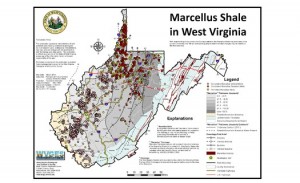Some 72 Million Man-Hours of Work in Marcellus Construction Since 2008
>>> MAP: The boom in natural-gas drilling in the Marcellus Shale has meant more than 70 million man-hours for workers building post-production infrastructure, such as pipelines and compressor stations in six states, including West Virginia, since 2008. Map by West Virginia Geologic and Economic Survey. <<<
From an Article by Dan Heyman, WV Public News Service, December 5, 2014
CHARLESTON, W.Va. – The Marcellus boom has meant more than 70 million man-hours of work building support infrastructure in the past six years, according to a new report. The study looked at jobs not connected to the actual drilling of the wells in six states.
Bob Bruno, a professor of labor and employment relations at the University of Illinois, dug into databases about the building of pipelines, compressor stations, processing facilities and other types of infrastructure. Those jobs, he said, totaled 72 million man-hours since 2008. “It’s an awful lot of work,” he said, “and the work that’s being done in natural gas was helping to not only keep employment levels up but keep unemployment levels down.”
All of this relates to what happens after the well is drilled and the gas comes out of the ground. Tom Gray, business manager for Laborers Local 1149 in Wheeling, said these are good jobs, averaging $24 to $28 an hour with solid benefits. He said their local has nearly doubled in size over the past two years.
“Anyone in this valley who is looking for a career can have one in any of the crafts,” he said. “Every craft has opened their doors, taken in new members. The opportunity is here for people in this valley who want to join a union.”
Gray said the projects are going up so quickly that the work includes a lot of overtime, with workers on the clock six or seven days a week. He added that they can hardly even get folks into their apprenticeship program fast enough to keep up with the demand.
“We are taking a lot of people, but that’s because we have a lot work,” he said. “Anybody that gets into the apprenticeship program is pretty well assured that if they answer the phone, and ‘ready, willing and able,’ they’re going to go to work.”
On the other hand, some citizen groups have criticized the gas industry for water and air pollution. Officials with trade unions doing much of the work say it can and needs to be done in a way that doesn’t cause those kinds of problems.
Bruno’s study is online at ler.illinois.edu. See also: www.FrackCheckWV.net

